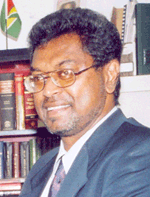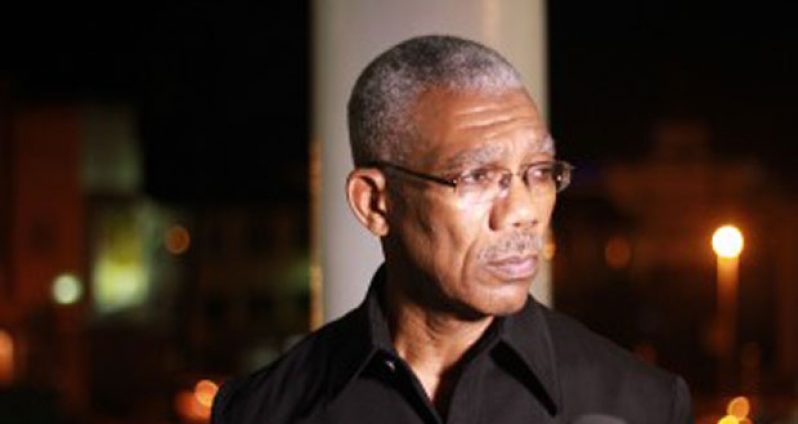THE combined Opposition APNU and AFC’s political game of wanting to remove the PPP/C Government was always in the making since the outcome of the 2011 General Elections became known. APNU and AFC together have a one-seat majority in Parliament; the result, a hung parliament. Therefore, there should be no surprise that the combined Opposition AFC/APNU is now mounting a no-confidence proposal against the PPP/C Government.

Since 2011, the PPP/C Government has been a minority government, meaning that the PPP/C Government does not have a majority in Parliament. APNU and AFC frequently flex their muscles toward removing the PPP/C Government because of this majority of one, with little attention paid to the long-term implications of their actions for nation building purposes.
However, whatever their political strategy, APNU and AFC with a parliamentary majority should not formulate policy and should not pressurise the Government to act against its will; in fact, parliament should desist from this type of behaviour (1) APNU and AFC are the Opposition parties. APNU and AFC are not the Government.
Minority governments have several advantages (1); and so despite its minority status, the PPP/C Government enjoys some of these gains as follows: (i) only one party controls the PPP/C which is the PPP/C; (ii) the PPP/C has demonstrated strong policy consistency – just look at its record of capital projects which have been constantly torpedoed by APNU and AFC; some of these capital projects are the Cheddi Jagan Airport Modernisation Project, Ogle Aerodrome assistance, Civil Aviation equipment and Hinterland/Coastal Airstrips, the specialist hospital, and the Amaila Hydropower Project; and (iii) the PPP/C Government makes policy decisions in a timely manner, so that policy benefits can reach the people quickly.
“But that will of the majority is not the ‘general will’ representing the nation, since some people would not have voted for the winning party. And so, while majority rule through elections is useful for selection, it is not appropriate for justifying democratic legitimacy.”
But the Opposition APNU and AFC have combined resources in Parliament to thwart benefits reaching ordinary people vis-à-vis delaying and blocking Government’s major capital projects. And this new power that APNU and AFC have in Parliament requires that they act responsibly and not merely to oppose for the sake of opposing.
An example of opposing for the sake of opposing is the current APNU and AFC’s engagement in some grand-standing exercises to signal that they are united in bringing the PPP/C Government down. This they intend to do through presenting and passing in Parliament the AFC-initiated no-confidence motion against the PPP/C Government. The Opposition APNU and AFC can make this happen through their one-seat majority.
However, the question people should ask is what took APNU so long to decide on whether it would support the AFC’s no-confidence motion, given that APNU was aware of this motion long before the PNC’s 18th Biennial Congress last month. APNU had sufficient time prior to this PNC’s Biennial Congress to pronounce on the AFC’s no-confidence proposal, and APNU did not take that course of action at that time.
Meanwhile, the blatant undemocratic practices imposed on the delegates at that PNC Congress produced bitterness and deep divisions within the PNC. And so for APNU to now say after the chaos at its Congress that it supports the AFC’s no-confidence proposal is its way of distracting ordinary Guyanese and, indeed, PNC members and supporters, from focusing on the mayhem and disunity that occurred at the PNC Congress. It is hardly likely that APNU would advance the no-confidence motion, once it becomes conscious that the no-confidence proposal is devoid of any populism.
The idea of this no-confidence proposal rests on the view that there is democratic legitimacy for this action, as the people are the legitimate source of power; where the AFC as the architect of the proposal argues that the basis of its proposal is the PPP/C Government’s Financial Paper No.1/2014 presented by the Minister of Finance. The AFC contends that the Minister of Finance through the Statement of Excess approved $4.5 billion from the $37.4 billion not approved by the combined Opposition out of the 2014 national budget of $220 billion.
In this no-confidence proposal, the AFC and now their much-needed ally APNU are invoking the will of the majority, that is, their one-seat majority in Parliament, as their basis for democratic legitimacy; but this will of the majority is not a principle of justification (2), to justify the no-confidence proposal.
In fact, the will of the majority mirrors the desiderata of a dominant section of the people, but does not represent the will of a whole nation; under such conditions, the no-confidence motion represents a limited idea of democracy (2). In fact, use of the majority mechanism is not a moral basis for parliamentary action when its long-term implications for the nation as a whole are not considered. Is the Guyanese nation aware of the total implications of the APNU/AFC’s no-confidence proposal in parliament? Is the Guyanese nation aware of the total implications of the APNU/AFC’s blockage of several of the PPP/C Government’s capital projects?
Nowadays, it is usual to see democratic legitimacy as having its basis in the majority. An election is a selection procedure used to win a majority of people, and the party that wins that majority, that is, the will of the majority, forms the government. But that will of the majority is not the ‘general will’ representing the nation, since some people would not have voted for the winning party. And so, while majority rule through elections is useful for selection, it is not appropriate for justifying democratic legitimacy (2). The AFC/APNU no-confidence vote via majority rule is couched in limited democratic legitimacy.
In fact, democratic legitimacy is dynamic and, therefore, efforts to achieve the strongest form of democratic legitimacy should be an objective for which all parliamentarians should strive.
APNU and AFC’s constant disruptive actions in Parliament to limit the PPP/C Government’s legislative agenda via slowing down the PPP/C Government’s capital projects will surely challenge them at any election.
References:
1. Hazell R, Paun A. Making Minority Government Work. Constitution Unit and Institute for Government. 2009.
2. Ragazzoni D. Democratic legitimacy: Impartiality, reflexivity, proximity. Contemporary Political Theory. 2014;13(3):e15-e8.
(By Dr. Prem Misir)




.png)









